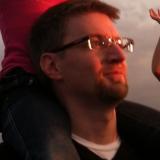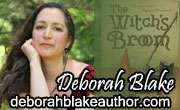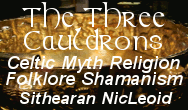Pagan Paths
The morning sun rising in the east calls to the Bright Youth in me, and the Bright Youth responds. The full moon calls to the Muse, and the waning and dark moon to the Dark Maiden who is a part of me. The earth I touch with my fingers calls to the Mother, in both her guises, Nurturing and Devouring. The bright green shoots rising from the earth and the green leaves on the trees on my street in the spring, these call to the Stag King, while the red leaves fallen to the earth in the autumn call to the Dying God. The spring storm that rises up suddenly in the west calls to the Storm King. The night sky, the dark space between the stars, calls to Mother Night, my death come to make peace. The gods-without call and the gods-within respond.
The Return of the Gods
Recently, P. Sufenas Virius Lupus created some online controversy by arguing that one of the “points” of modern Paganism is to “bring back the gods”. Lupus’ post was written in the context of a wider discussion about the place of Polytheism within contemporary Paganism, which began when several prominent Polytheists decided to disassociate themselves from the term “Pagan”. (For more on this see here and here.)
Part of the reason for the antipathy of many Polytheists for Paganism is the perception that for Pagans the gods are personifications of natural forces or Jungian archetypes, whereas for Polytheists the gods are, in Lupus’ words, “actual beings with independence, volition, and power”. Polytheistic practice, according to Lupus, “presupposes a definite being with volition and consciousness on the other end of the interaction.” In contrast, Jungian archetypes are often understood by Pagans as mere metaphors of of natural or psychological processes. A Polytheist who understands the archetypes in this way might well wonder why would anyone worship the creations of their own mind.
In the 1960s and 70s, Pagans seized onto Jung’s conception of archetypes as a way of legitimizing Pagan polytheism in the face of the crumbling claims to historical authenticity. In the process though, the gods of Paganism became psychologized, and they lost their numinous quality. (Numinosity refers, in part, to the mysterious “otherness” of an encounter with the divine.) The Pagan gods had become archetypes, but Pagans had lost the sense of the archetypes as gods. In reaction, many Polytheists in search of communion with numinous Others rejected Jungian Paganism in favor of a radical (or “hard”) polytheism which treats the gods as beings existing independent of the human psyche.
I believe that this rejection of Jungian archetypes is the result of a misunderstanding by many Pagans of Jung’s concept of archetypes. Jung would say that, while the gods may be a part of us, we must remember that they are also other than us, if by “us” we mean our conscious mind or ego-self. Thus, Jung could say that “the world of gods and spirits is truly ‘nothing but’ the collective unconscious inside me”, and in the same breath say that “the collective unconscious is the world of gods and spirits outside me”. This is why Jung called the archetypes “gods” and compared the psyche to an “Olympus full of deities who want to be propitiated, served, feared and worshipped”. He wrote that moderns congratulate ourselves
"imagining that we have left all these phantasmal gods far behind. But what we have left behind are only verbal spectres, not the psychic facts that were responsible for the birth of the gods. We are still as much possessed by autonomous psychic contents as if they were Olympians. [...] Zeus no longer rules Olympus but rather the solar plexus."
The gods are not gone; they have just come home -- to the psyche.
This was not mere metaphor. Jung wrote this religious language offers the only “adequate” vocabulary to describe the experience of being faced with the power of the archetypes. He explained that we experience the archetypes as gods because they are beyond our conscious control. They have the power to transform our lives in the way that we would expect of gods, the power to, in the words of Gilbert Murray, “bring man bliss or tear his life to shreds”. These powers, says Jung, surely deserve to be called gods as they compel “the same belief or fear, submission or devotion which a god would demand from [humankind].”
While the Jungian gods are part of the human psyche, it should be remembered that the Greek term psyche is better translated as “soul” than as “mind”. Too often, in discussions of the psychological nature of Pagan gods, the modifier “just” is inserted immediately preceding the word “psychological”, as in, “The Pagan gods are just psychological”, as if to say they are mere figments of one’s imagination that one can create at will. This a profound misunderstanding of Jung’s theory of the psyche. Jung said that ultimately “it does not matter whether the gods are ‘inside’ or ‘outside’.” This is because the psyche is far more mysterious and more capacious than our conscious mind can imagine. Jung wrote that “the psyche is the mother and the maker, the subject and even the possibility of consciousness itself. It reaches so far beyond the boundaries of consciousness that the latter could easily be compared to an island in the ocean.”
The de-godding of the archetypes by Pagans resulted largely from a confusion of symbol with archetype. According to Jung, symbols refer to, but are not identical with, the archetypes located deep in the unconscious. The unconscious transcends the ego in the same way the gods transcend mortals. While symbols have a conscious and known meaning, the archetypes remains unknown and inexhaustible. Symbols can only ever be partial expressions of the archetypes. The moment an archetype is fully comprehended by the conscious mind is the moment is ceases to be an archetype. The claim that any symbol could fully comprehend the meaning of an archetype would be a kind of psychic idolatry.
In addition, archetypes cannot be created consciously. The archetypes arise from the unconscious, not the conscious mind. Jung writes, “Psychologically speaking, the domain of ‘gods’ begins where consciousness leaves off.” This is why the gods visit us in our dreams, our imagination, and in our art. The notion that one could consciously create archetypes would have been as foreign to Jung as the so-called “plug-and-play” gods of some Pagans are to Polytheists. Archetypes can no more be created than our dreams can be created. The archetypes, like dreams, are something that happens to us, not something we cause to happen.
Friedrich Schiller famously called the disenchantment of nature die Entgotterung der Natur, the “de-godding of nature.” The Pagan project of re-enchanting the world, then, might well be called the "re-godding" of nature. If they are understood as mere metaphors, Jungian archetypes lack the numinosity that would qualify for a true “return of the gods”. But the revitalized understanding of the archetypes that I have outlined above might serve as a bridge between Polytheists and Pagans, even as many of them now try to distance themselves from each other. In my next post, I will show how Jung’s description of the experience of the archetypes closely resembles the Polytheistic description of encounter with the gods, and how Jung's archetypes might satisfy Lupus’ call for the return of gods with “independence, volition, and power”.
Comments
-
 Thursday, 17 January 2013
Thursday, 17 January 2013"And if so, is it than 'my' unconsciousness where they reside or perhaps in the unconsciousness of that other place or person."
That's an interesting question. I think one way to begin looking for an answer is to find out whether your experience of the gods is the same as others'. What does it mean when two polytheists have very different experiences of the same deity. Are they experiencing the same deity? This is something I have written about before: http://allergicpagan.wordpress.com/2012/10/04/are-the-gods-real/
"Yet, it seems to transcend myself really."
I agree, but what most people consider "themselves" is really only the tip of the iceberg, I think.
"Can you explain your view, or that of Jung, on the possibility of a collective unconsciousness? "
Jung's notion of a collective unconscious deserves a whole post (probably several posts) and that will be forthcoming. Personally, I shy away from metaphysical interpretations of a collective unconscious. I think thousands of years of shared evolution, shared biology and physiology, and shared social structures is sufficient to explain the similarities in our individual encounters with the unconscious. I am open to the possibility that there is more going on. I just haven't seen any need (yet) to resort to other explanations. Ockham's Razor and all. -
 Saturday, 16 February 2013
Saturday, 16 February 2013Chas Clifton reports that Robert Anton Wilson published an article in the old Llewellyn Publications magazine Gnostica, involving an account of a mystical experience involving the Virgin of Guadalupe, where Wilson wrote how if you treated the gods as archetypes, they could surprise you by acting like gods. And vice versa. http://www.chasclifton.com/2007/01/robert-anton-wilsons-passing.html
-
Please login first in order for you to submit comments




















This is very interesting and I am curious how P. Sufenas will respond to this one. In any case it will lead to a more productive debate. I am agnostic as to the nature (though not the existence) of the gods. I think the Jungian theory is a plausible one, but frankly I no longer feel the urge to seek any naturalistic explanation for them. I think it is likely that the gods will operate in my unconscious, but I am not sure that is the only place they reside. I like Allison Leigh Lilly's understanding of a relational concept of the gods better. When I recognize the gods' presence in the great outdoors for example, is this really located in my (un)consciousness? Or do the gods arise, when I connect to some other person or place? And if so, is it than 'my' unconsciousness where they reside or perhaps in the unconsciousness of that other place or person. Due to the language you are using in your post, you seem to unconsciousness as an individual characteristic first and foremost. Yet, it seems to transcend myself really. And not just because all humans share a similar brain I think. Can you explain your view, or that of Jung, on the possibility of a collective unconsciousness? My Jungian is a bit rusty.